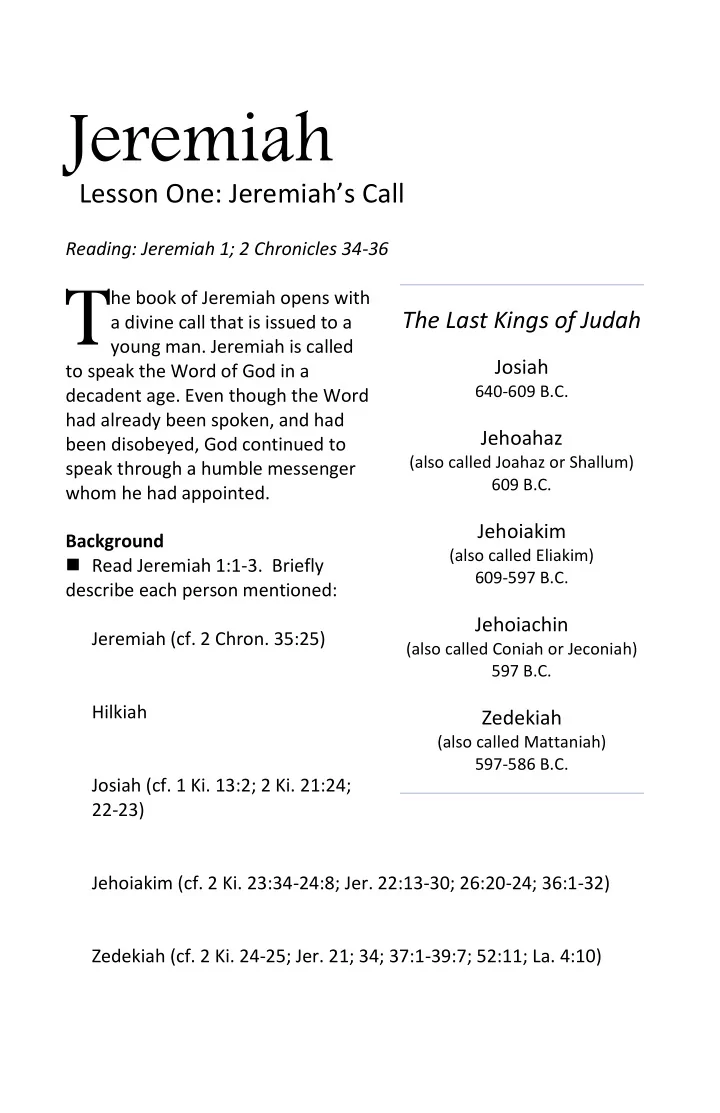

Jeremiah Lesson One: Jeremiah’s Call Reading: Jeremiah 1; 2 Chronicles 34-36 T he book of Jeremiah opens with The Last Kings of Judah a divine call that is issued to a young man. Jeremiah is called Josiah to speak the Word of God in a 640-609 B.C. decadent age. Even though the Word had already been spoken, and had Jehoahaz been disobeyed, God continued to (also called Joahaz or Shallum) speak through a humble messenger 609 B.C. whom he had appointed. Jehoiakim Background (also called Eliakim) Read Jeremiah 1:1-3. Briefly 609-597 B.C. describe each person mentioned: Jehoiachin Jeremiah (cf. 2 Chron. 35:25) (also called Coniah or Jeconiah) 597 B.C. Hilkiah Zedekiah (also called Mattaniah) 597-586 B.C. Josiah (cf. 1 Ki. 13:2; 2 Ki. 21:24; 22-23) Jehoiakim (cf. 2 Ki. 23:34-24:8; Jer. 22:13-30; 26:20-24; 36:1-32) Zedekiah (cf. 2 Ki. 24-25; Jer. 21; 34; 37:1-39:7; 52:11; La. 4:10)
Who is Judah? Where is Israel? What was the “exile of Jerusalem?” Jeremiah’s Call When did God call Jeremiah? How did Jeremiah first feel upon receiving this call? What were some of the challenges he faced at the beginning of his ministry? When did God appoint Jeremiah? (Jer. 1:5). What does this tell us about God’s view of the unborn? (see Ps. 139:13 -16). What does it mean to be “consecrated?” Does Exodus 13:2, 12 help your understanding? Jeremiah’s Message What is “inspiration?” What do we know about the process, and how should this affect the way we read God’s Word? (see Jer. 1:9; 2 Sam. 23:12; 1 Cor. 2:9-13; 4:6; 2 Tim. 3:16-17; 2 Pet. 1:21). Why did God communicate to Jeremiah with visions? Does he communicate to us in this manner today? (cf. Heb. 1:1-2). What visions did Jeremiah see, and what was their significance? Vision #1 (vv. 11-12) _______________________________________ ________________________________________________________ Vision #2 (vv. 13-16) _______________________________________ ________________________________________________________
What was Jeremiah’s basic message to Judah ? What would it accomplish? Would this be an easy message to deliver? Why and how was God punishing Judah? Who is the “north”? Important Dates Israel Falls to Assyria Why did God have to do this? 721 B.C. Jeremiah Begins Preaching 627 B.C. Jeremiah Today Nineveh Falls to Babylon Do Christians receive a “call”? (see 612 B.C. Acts 2:38-39; Rom. 8:28; 1 Cor. 1:2, 26- Josiah Dies 31; 2 Thes. 2:14; 2 Tim. 1:4). Are we 609 B.C. called in the same manner as Jeremiah? Judah Conquered by Babylon; Captives Taken (Incl. Daniel) 605 B.C. What are we called to do? Does everybody have the same kind of Jehoiachin, Ezekiel, and 10,000 calling? (see Matt. 25:13-30; Rom. 12:4- More Taken Captive 8; 1 Cor. 12:12-31). 597 B.C. Jerusalem & Temple Destroyed 586 B.C. Did what you learned about Captives Released by Persia Jeremiah’s call make a difference in your 536 B.C. life? If so, how?
Readings for Meditation “Inspirati on is that mysterious process by which the divine causality worked through the human prophets without destroying their individual personalities and styles to produce divinely authoritative and inerrant writings.” Norman L. Geisler and William E. Nix, General Introduction to the Bible “It is possible that the word of Jehovah may be uttered, and men may not detect it as the word of Jehovah, and so may murder the messenger. We need to pray, not merely that the word of Jehovah may come to us, but that we may know it when it comes, lest we also perish by the way, and that, with the blood of the messenger upon our hands.” -G. Campbell Morgan “ In the [eternal purpose of God ] all things pertaining to man’s redemption are set before God, and among them his predetermination that man should be called by the gospel. “In which (salvation) he called you by our gospel.” [2 Thes. 2:14] Hence to be called according to God’s purpose…is to be called by the gospel. It is therefore not to be called by some secret impulse of the Holy Spirit; neither is it to be called “effectually” or “ineffectually,” as the schoolmen phrase it. It is simply to be called by hearing the gospel preached. This call we are absolutely free to accept or reject; and accordingly as we do that or this, we will be saved or lost.” -Moses Lard
Recommend
More recommend